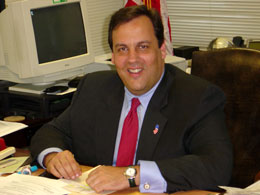In their vision of a more perfect future, racetrack operators in the state of New Jersey are hoping to see throngs of technologically savvy young people silently tapping their wagers into their smartphones and other mobile devices before heading off to watch the races.
That scenario very well may soon be a reality, as this past Monday New Jersey’s Republican Governor, Chris Christie, signed a law allowing such wagering to be permitted at Garden State racetracks.
Admitting that the law is not directed at everyone but rather is meant to appeal to, and hopefully attract, a younger group of patrons to the state’s racing tracks, the bill’s sponsor, State Assemblyman John Burzichelli, praised the new law for advancing New Jersey’s horse racing industry “into the twenty-first century” saying, “It’s technology allowing the racing industry to reshape itself by drawing younger customers.”
Mobile wagering will only be permitted while the bettor is physically present at the grounds of the racetrack; the mobile betting applications will not function once the patron has left the property.
Regulators will be working to establish a system to mitigate cheating and other types of fraud. The New Jersey Racing Commission will also seek to put in place safeguards in order to prevent underage gambling by the use of such devices.
The racetrack interests are thrilled with the new law, saying it will save patrons time typically spent waiting in lines to place their bets. Of New Jersey’s four racetracks, at least one, Monmouth Park in Oceanport, plans to begin offering the service to customers quite quickly; they hope to have mobile wagering in place by mid-May.
The other three racetracks in the state – Atlantic City Race Course, the Meadowlands, and Freehold – have not yet announced when they plan to roll out their mobile wagering clients, however we imagine the timeframes will all be somewhat competitive.
In addition to targeting a potential pool of younger racetracks patrons, lawmakers in New Jersey hope that by offering more modern conveniences at area racetracks, they will also be able to compete with casinos and other gambling properties located in neighboring states. As states across the nation are scrambling to increase tax revenue left deflated by the housing crisis and recession, more and more are looking to broaden their gambling landscape or to introduce gambling regulation for the first time.
“If our horseracing industry is going to remain attractive to visitors and competitive with neighboring states, it’s important that it keep up with the latest innovations and trends,” said Burzichelli.
In related news, it remains to be seen whether or not Christie will sign into law a bill that was passed last year by the state legislature that would permit expanded online gambling in the state. Christie has until February 7 to act on the legislation, which would allow state residents to access online poker rooms and to place other forms of Internet wagers as well.
Christie will have the choice of vetoing the bill, signing it into law, or doing nothing and allowing the law to passively take effect. Sources close to the situation say that Christie, who has made no secret that he aspires to higher office and therefore often closely hews to his party’s anti-expanded gambling ethos, will likely allow the bill to take effect automatically.
New Jersey’s neighbor state of Delaware has already passed legislation allowing for its residents to play online poker while they are physically located in the state, joining Nevada in green-lighting the game. Other states are also looking into regulation of online poker and other forms of Internet wagering, including California, Mississippi, and Iowa.

